第4章 CHAPTER I(3)
Madame Rouget, or, to speak more correctly, the doctor, inherited all the property, landed and personal, of Monsieur and Madame Descoings the elder, who died within two years of each other; and soon after that, Rouget got the better, as we may say, of his wife, for she died at the beginning of the year 1799. So he had vineyards and he bought farms, he owned iron-works and he sold fleeces. His well-beloved son was stupidly incapable of doing anything; but the father destined him for the state in life of a land proprietor and allowed him to grow up in wealth and silliness, certain that the lad would know as much as the wisest if he simply let himself live and die. After 1799, the cipherers of Issoudun put, at the very least, thirty thousand francs' income to the doctor's credit. From the time of his wife's death he led a debauched life, though he regulated it, so to speak, and kept it within the closed doors of his own house. This man, endowed with "strength of character," died in 1805, and God only knows what the townspeople of Issoudun said about him then, and how many anecdotes they related of his horrible private life. Jean-Jacques Rouget, whom his father, recognizing his stupidity, had latterly treated with severity, remained a bachelor for certain reasons, the explanation of which will form an important part of this history. His celibacy was partly his father's fault, as we shall see later.
Meantime, it is well to inquire into the results of the secret vengeance the doctor took on a daughter whom he did not recognize as his own, but who, you must understand at once, was legitimately his.
Not a person in Issoudun had noticed one of those capricious facts that make the whole subject of generation a vast abyss in which science flounders. Agathe bore a strong likeness to the mother of Doctor Rouget. Just as gout is said to skip a generation and pass from grandfather to grandson, resemblances not uncommonly follow the same course.
In like manner, the eldest of Agathe's children, who physically resembled his mother, had the moral qualities of his grandfather, Doctor Rouget. We will leave the solution of this problem to the twentieth century, with a fine collection of microscopic animalculae; our descendants may perhaps write as much nonsense as the scientific schools of the nineteenth century have uttered on this mysterious and perplexing question.
Agathe Rouget attracted the admiration of everyone by a face destined, like that of Mary, the mother of our Lord, to continue ever virgin, even after marriage. Her portrait, still to be seen in the atelier of Bridau, shows a perfect oval and a clear whiteness of complexion, without the faintest tinge of color, in spite of her golden hair. More than one artist, looking at the pure brow, the discreet, composed mouth, the delicate nose, the small ears, the long lashes, and the dark-blue eyes filled with tenderness,--in short, at the whole countenance expressive of placidity,--has asked the great artist, "Is that a copy of a Raphael?" No man ever acted under a truer inspiration than the minister's secretary when he married this young girl. Agathe was an embodiment of the ideal housekeeper brought up in the provinces and never parted from her mother. Pious, though far from sanctimonious, she had no other education than that given to women by the Church. Judged, by ordinary standards, she was an accomplished wife, yet her ignorance of life paved the way for great misfortunes.
The epitaph on the Roman matron, "She did needlework and kept the house," gives a faithful picture of her simple, pure, and tranquil existence.
Under the Consulate, Bridau attached himself fanatically to Napoleon, who placed him at the head of a department in the ministry of the interior in 1804, a year before the death of Doctor Rouget. With a salary of twelve thousand francs and very handsome emoluments, Bridau was quite indifferent to the scandalous settlement of the property at Issoudun, by which Agathe was deprived of her rightful inheritance.
Six months before Doctor Rouget's death he had sold one-half of his property to his son, to whom the other half was bequeathed as a gift, and also in accordance with his rights as heir. An advance of fifty thousand francs on her inheritance, made to Agathe at the time of her marriage, represented her share of the property of her father and mother.
Bridau idolized the Emperor, and served him with the devotion of a Mohammedan for his prophet; striving to carry out the vast conceptions of the modern demi-god, who, finding the whole fabric of France destroyed, went to work to reconstruct everything. The new official never showed fatigue, never cried "Enough." Projects, reports, notes, studies, he accepted all, even the hardest labors, happy in the consciousness of aiding his Emperor. He loved him as a man, he adored him as a sovereign, and he would never allow the least criticism of his acts or his purposes.